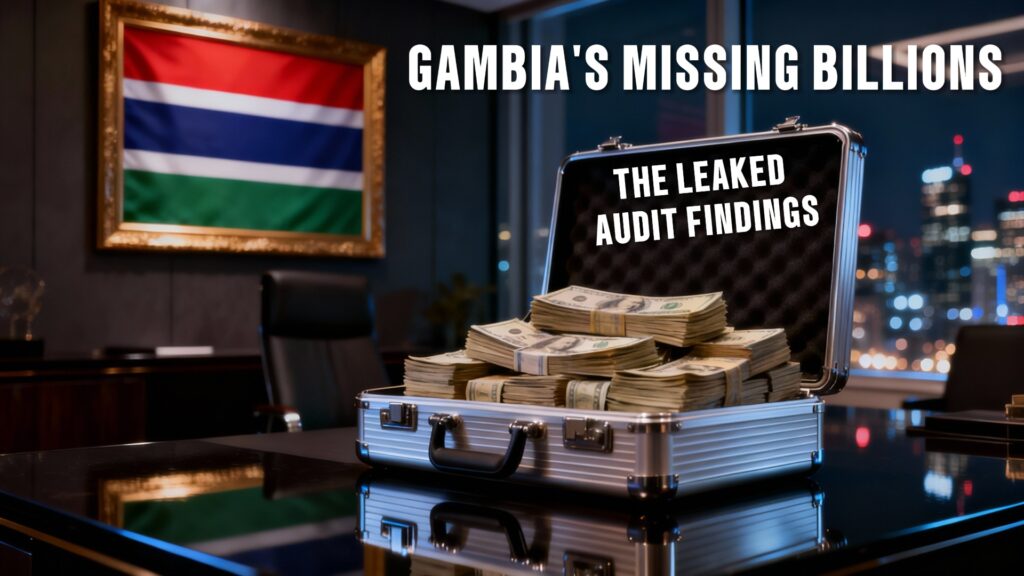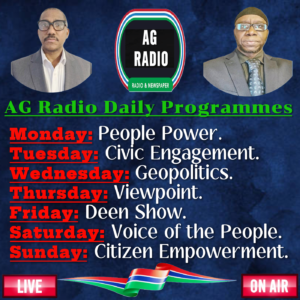
The government buys vehicles, equipment, furniture, computers, and land with taxpayers’ money every year. Those items are supposed to be listed in an asset register, tagged, recorded, and verified during an audit.
But for three straight years, the Auditor General found that billions of dalasis in public assets have no paper trail, no tags, and sometimes no physical existence.
The numbers don’t lie:
• D241 million in timber-sale proceeds are still missing.
• D14.7 million worth of government vehicles sold without receipts or buyer documentation.
• D8.3 million in livestock sales with no records.
• D43.7 million in Janneh-Commission recoveries never posted.
• D24.4 million from the Mega Bank sale is not reflected in Treasury accounts.
• Dozens of ministries with no updated fixed-asset registers.
The result is that the state owns less and less on paper, even as the budget keeps buying more.
1. Vehicles: Sold, Lost, or “Transferred”
In 2023, the audit traced D14.7 million in vehicle sales but could not find receipts or valuation reports.
Some “auctioned” vehicles had no record of who purchased them; others were transferred to unnamed “institutions.”
Plain talk: If a car was bought with public funds, it must carry the Government or institution plate, an asset tag, and a sales receipt when disposed of.
Without that, anyone could drive away a government vehicle for free.
2. Timber & Wildlife: D241 Million Vanished
Proceeds from 2,393 containers of rosewood exports, valued at D241 million, never reached the Consolidated Fund.
The sales were meant to recover revenue from illegal timber stocks seized between 2019 and 2021.
Auditors saw no bank deposit slips, transfer memos, or reconciliation between Forestry, Finance, and GRA.
Every missing container equals a school, clinic, or feeder road that could have been built.
3. Livestock & Seizures
The Ministry of Agriculture reported D8.3 million from cattle sales through the Sheriff’s Division.
Yet the audit found no receipts, buyer names, or deposit confirmations.
In one case, 724 cattle were sold, but the only record was a handwritten list with no totals.
When animals become invisible money, that’s not agriculture, it’s leakage.
4. Janneh Commission & Mega Bank: Recovery Funds Gone Missing
• Janneh Commission recoveries: D43.7 million not reflected in the Treasury books 2023.
• Mega Bank sale: The government sold the bank for D921 million but recorded only D896 million, a D24.4 million gap outside regular oversight.
These were once Jammeh-era assets recovered in the people’s name.
If their proceeds vanish again, history repeats itself.
5. Ministries Without Asset Registers
Across 2021–2023, auditors found that many MDAs had not updated their vehicle, furniture, ICT equipment, or plant and machinery registers.
Some could not produce a list of assets bought under donor projects.
Others recorded items with “TBA” (to be assigned) as the serial number.
Without a register:
• Assets can be stolen or swapped with no trace.
• Depreciation and insurance are misstated.
• The public can’t know what it actually owns.
Think home: you keep buying furniture but never write down what you have, so no one notices when a chair goes missing.
6. Buildings & Land: Titles Without Proof
The audit reports show that no central record exists for state-owned land and buildings.
Some MDAs occupy premises “on loan” from others without any signed transfer or valuation.
In some instances, public plots were leased to private individuals with no evidence of payment to the Treasury.
If the state can’t prove what land it owns, it risks losing it permanently.
7. Donor-Funded Projects: Equipment Without Hand-Over
World Bank, Saudi Fund, and other partners financed projects under ministries like Health, Roads, and Agriculture.
Auditors found that equipment purchased through these programs was handed to MDAs without acknowledgement letters, serial-number tagging, or delivery reports.
That means donor items can disappear before citizens ever benefit.
8. Why This Matters to You
• Every “missing” asset is your tax money turned into someone’s private property.
• Every untagged car or laptop is an invitation to theft.
• Every unrecorded donor item makes future aid harder to justify.
When a government cannot show what it owns, it cannot protect what it owes.
9. FPAC’s Job Now
1. Summon the Ministries of Finance, Works, Forestry, and Agriculture to table complete asset registers (2021–2023).
2. Ask for bank statements showing where the timber, livestock, and vehicle-sale money went.
3. Require every donor-funded project to provide equipment handover lists and tagging records.
4. Instruct the Accountant General to publish a national fixed-asset register online, updated quarterly.
5. Direct Treasury to recover all missing sale proceeds and surcharges from officials responsible.
10. The People’s Moral Bottom Line
Budgets build assets, roads, cars, and equipment.
But when those assets vanish from paper, the people’s wealth evaporates into private pockets.
Public ownership begins with public records.
Until every dalasi spent on an asset is backed by a tag, a register, and a receipt, the question will not go away:
*” Where are the things we paid for?”
By Jallow Modou, Washington, D.C – Financial Analyst
Making the Audit Speak for the People


